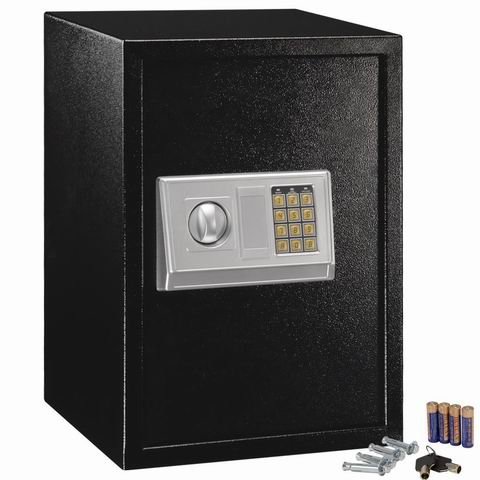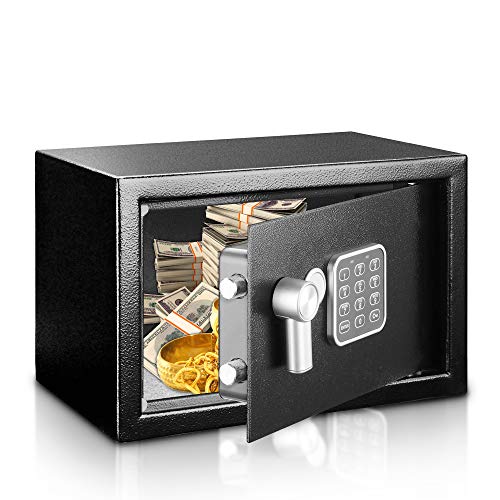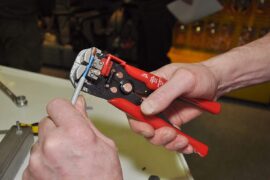The history of the modern home safe can be traced in 1835. English inventors Charles and Jeremiah Chubb started producing safes that are meant to resist burglary. From there, homeowners and businesses have started using the contraption to keep their valuables “safe.”
The invention itself has undergone multiple evolutions since and it now comes in many forms. Now, home safes can be kept out in the open or hidden in corners or in the floors. They can be big and boxy or slim and sleek. (Additional Read: The Best Small Safes For Your Home)
Accessing safes can also be done in a wide variety of means. There are the dials, the keypads, the biometric systems, and even those that respond to apps. You are practically spoiled for choice, which can be a bit overwhelming.
To help you make your decision easier as to which safe to choose, the five options featured here are worth looking into. These are some of the strongest, most secure, and most reliable home safes in the market. They will help keep your money, jewels, precious documents, and more completely safe.
Best Home Safes Comparison & Rating
1. Safstar Electronic Digital Safe
This is a decent home safe to have, especially if you are looking for excellent protection against most burglary attempts. It is well-made and constructed with durability in mind. So you won’t have to worry about anyone easily breaking into the safe. The keypad itself is responsive and easy to use when inputting the access codes. This safe has plenty of room for your documents, valuables, and money, too.
2. TIGERKING Digital Security Safe Box
This is an excellent if basic home safe. It will keep your documents and valuable items safe from theft. You will also have a reliable place to store things that you might otherwise lose or forget. Thanks to the key and keypad lock system, the contents of the safe will be doubly protected. In terms of construction, the steel is of excellent quality and is one-inch thick for guaranteed durability.
3. AmazonBasics Home Keypad Safe
This is a fantastic double-security home safe. You need to use a key and the keypad to open it, which immediately makes it harder to break into. Best of all, the key itself will help override the keypad in case you forgot your code. The size of the safe itself is compact and perfect for home use. At the same time, it is built to last a long time thanks to the 8-gauge steel door and 14-gauge steel body.
4. AmazonBasics Steel Security Safe Lock Box
This is one of the most reliable nondescript home safes you will find on the market. It’s easy to carry around for mounting or hiding. As such, it will be difficult for burglars to find if you want to place it behind a painting or under the floorboards. It’s also incredibly resistant to fire, so you will still be able to recover your valuables if your home caught fire. As for space, it has enough for cash and even some small firearms.
5. SereneLife Safe and Lock Box
For those who simply want a personal safe to have at home, this is the perfect option. It can easily be installed by either you or a professional. Since it doesn’t weigh that much, you can even bring this with you wherever you go. You can tell that it’s a tough safe because of how thick the walls are too. The door does not come with any shaking or rattle once it’s locked as well.
Best Home Safes - Buyer's Guide
Home safes come in different types of locks, including combination, analog key lock, electronic key lock, electronic or digital keypads, and biometrics. Which one you choose will affect the price, the level of security that you get, and the convenience of opening the safe. Without a doubt, using a key or a fingerprint scanner to open your safe is the most convenient, but it can also be a vulnerability. Keep this in mind.
How big or small your safe will be will impact how much it can hold, how heavy it’s going to be, and how much value you can get out of it. Most home safes don’t really need to be bigger than two cubic feet. You will likely only be keeping a few things inside them like emergency funds, your seal documents, some valuable heirlooms, and the like. The rest can be in the bank. As such, you should only get a safe that truly suits your needs.
It’s important to consider factors like length, width, and depth when looking into getting a home safe. In many cases, you can get a vaguely cube-shaped one that you can just place in the corner. However, there are also safes that you can place on the wall, on the floor, under your desk, and so on. The dimensions will affect your options since you need to consider if they are too wide, too slim, too narrow, and so on.
Safes can range from general-purpose ones that can store anything to really specific types. There are those intended specifically for documents, for firearms, for precious metals, and even for statues and paintings. Standard home safes in the market will often suit most needs, though, so you shouldn’t have trouble finding exactly what you want
Home safes are not only intended to keep your valuables from being stolen. They are also useful for preventing them from getting damaged. This is why most safes are designed to be resistant to fire and heavy impacts. This is to ensure that you can still retrieve your documents or money if your home caught fire or there is an earthquake.
Best Home Safes - FAQs
If you are planning on keeping valuables at home instead of a bank, then yes, home safes are definitely worth getting. They can basically work as insurance in case there is a robbery, a house fire, or some kind of natural disaster. They will also ensure that you will never lose anything you value since you will always know where you are keeping them.
Home safes are typically where you place things like jewelry, precious metals, paper cash, valuable documents, identification like passports, and for those who have one, their firearms. This is because it would be difficult to lose things that are already in a safe. The containers are also difficult to accidentally access by small children and are highly resistant to fire damage.
Generally speaking, you should only get a home safe when you already have valuable items that you intend to keep in the house instead of anywhere else. In the long run, having a home safe is actually much cheaper than maintaining a safety deposit box, for example. At the same time, unless you tell absolutely everyone what you are keeping in the safe, there is practically no chance that anyone would put in an incredible amount of effort to open it.
Home safes can vary in size but for most private residences, a small one should be enough. Home safes can typically range in capacity from 0.82 to 2.05 cubic feet, the smallest of which is perfect for documents, emergency funds, and small firearms. You only really need huge home safes if you are planning on keeping large, valuable objects at home like statues made of precious metal or stacks of gold bars.











